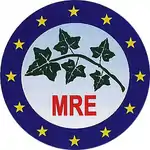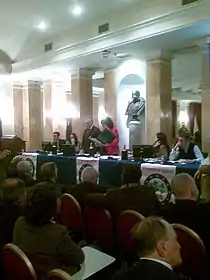European Republicans Movement
The European Republicans Movement (Italian: Movimento Repubblicani Europei, MRE) was a small social-liberal political party in Italy.
European Republicans Movement Movimento Repubblicani Europei | |
|---|---|
 | |
| Former leaders | Luciana Sbarbati, Adriano Musi |
| Founded | 6 March 2001 |
| Dissolved | 28 February 2011 |
| Split from | Italian Republican Party |
| Merged into | Italian Republican Party |
| Headquarters | via IV Novembre, 107-108 00187 Rome |
| Newspaper | none |
| Membership (2006) | 2,600[1] |
| Ideology | Social liberalism[2] |
| National affiliation | The Olive Tree (2001–2007) The Union (2005–2008) Democratic Party (2007–2010) |
| European affiliation | European Liberal Democrat and Reform Party |
| Website | |
| http://www.repubblicanieuropei.org/ | |
From 2007 to 2010 the party was a founding member and associate party of the Democratic Party, the leading centre-left party of the country. In 2011 the MRE was merged into the Italian Republican Party, the party from which it seceded in 2001. The MRE was a member of the European Liberal Democrat and Reform Party (ELDR)[3] and its long-standing leader was Luciana Sbarbati.
History
In 2001 the Italian Republican Party (PRI), after five years within the centre-left coalition The Olive Tree, decided to join the centre-right House of Freedoms. The MRE was formed by those Republicans who refused such decision and wanted to remain in the centre-left. The MRE took part to the consolidation of The Olive Tree as a joint electoral list both for the 2004 European Parliament election and the 2006 general election, along with the Democrats of the Left and Democracy is Freedom – The Daisy. The list won 220 out of 630 deputies (including two Republicans, Luciana Sbarbati and Adriano Musi) as part of The Union.
In 2007 the MRE was a founding member of the Democratic Party (PD), but continued to exist as associate party and retained almost entirely its autonomy. In the 2008 general election Sbarbati and Musi were elected to the Senate and often distinguished themselves from Democrats in key votes. Notably they opposed European Parliament electoral law reform in 2009.[4]

The common battle against electoral reform favored a reconciliation with the PRI. During the 2009 congress of the MRE the two parties signed a joint declaration, under the declaration, despite their different coalition allegiances, they pledged to join forces on key issues, especially civil liberties and freedom of research.[5][6]
In April 2010 Sbarbati led the MRE out of the PD and joined the group of the Union of the Centre (UdC) in the Senate.[7][8] As of January 2011 the party tried a reconciliation with the PRI, which was reached in March 2011.[9][10][11]
Leadership
- Secretary: Luciana Sbarbati (2001–2011)
- President: Adriano Musi (2001–2010)
References
- "Archived copy". Archived from the original on 2007-08-17. Retrieved 2007-04-11.CS1 maint: archived copy as title (link)
- Nordsieck, Wolfram (2006). "Italy". Parties and Elections in Europe. Archived from the original on 10 October 2007. Retrieved 20 April 2019.CS1 maint: unfit URL (link)
- http://members.eldr.eu/index.php?id=4&no_cache=1&tx_eldr_pi1[countryId]=9
- "Archived copy". Archived from the original on 2011-07-16. Retrieved 2009-02-27.CS1 maint: archived copy as title (link)
- "Archived copy". Archived from the original on 2013-11-11. Retrieved 2013-04-23.CS1 maint: archived copy as title (link)
- "Archived copy". Archived from the original on July 16, 2011. Retrieved March 4, 2009.CS1 maint: archived copy as title (link)
- "Archived copy". Archived from the original on 2010-05-01. Retrieved 2010-04-28.CS1 maint: archived copy as title (link)
- "Napolitano ha sciolto le camere". Il Post (in Italian). 2012-12-22. Retrieved 2020-08-22.
- "La conferenza stampa Nucara-Sbarbati/E' stato superato il tripartito delle divisioni post congresso di Bari". Pri.it. Archived from the original on 2013-11-11. Retrieved 2014-07-15.
- "Archived copy". Archived from the original on July 22, 2011. Retrieved March 4, 2011.CS1 maint: archived copy as title (link)
- Piccinelli, Marco (2015-03-11). "Il Partito Repubblicano Italiano dopo il suo quarantasettesimo congresso". Formiche.net (in Italian). Retrieved 2020-08-22.